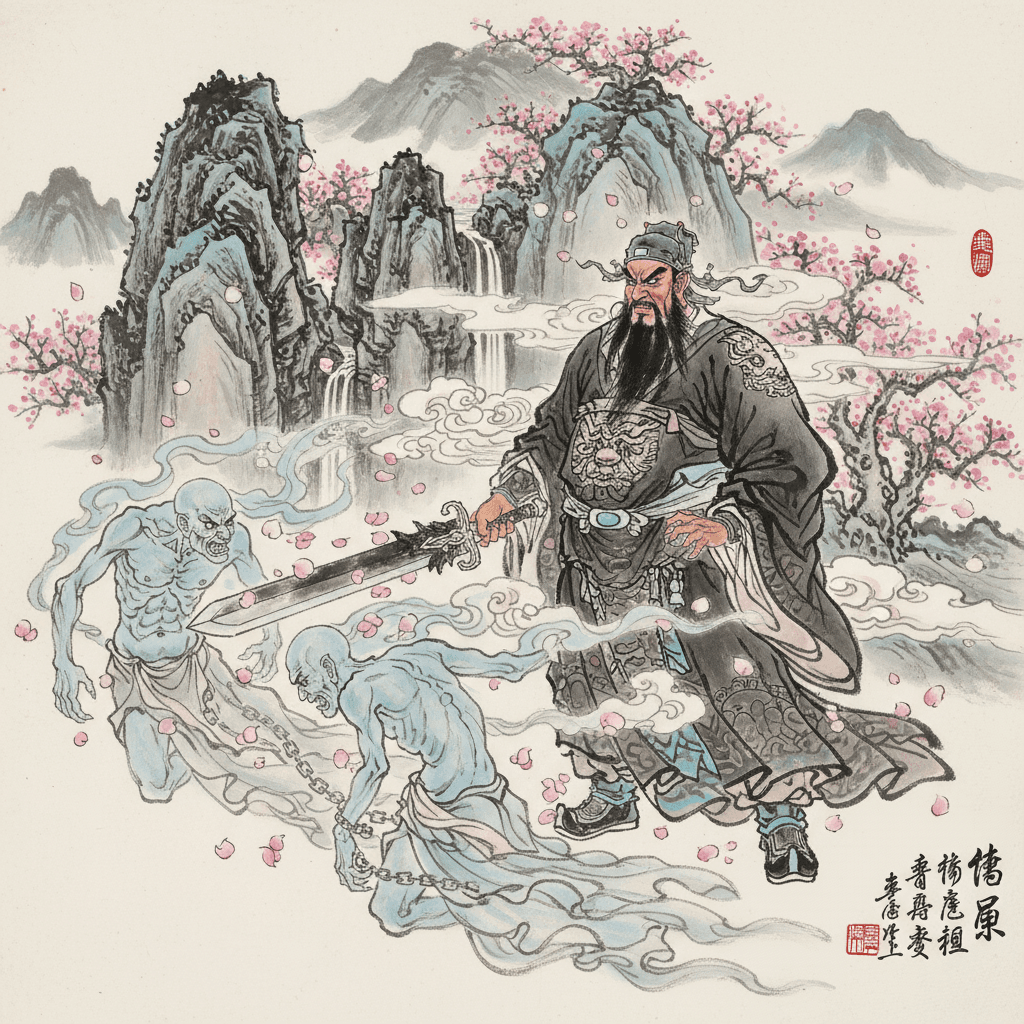The Pacification of Ghosts - Chapter Nine: Collecting Two Brothers at Peach Blossom Mountain
Following the God of Poverty's warning, Zhong Kui's team arrived at Peach Blossom Mountain (桃花山). The mountain should have been beautiful in spring...

Following the God of Poverty's warning, Zhong Kui's team arrived at Peach Blossom Mountain (桃花山). The mountain should have been beautiful in spring, but the peach trees were withered on one side and overgrown wild on the other, as if the mountain itself was split in two.
Local villagers explained the strange phenomenon: "Two ghost brothers control the mountain. One demands absolute loyalty and kills anyone who shows independence. The other promotes complete selfishness and punishes any act of cooperation. We're trapped between two extremes!"
Han Yuan studied the situation. "This is philosophical warfare. They're not just fighting each other—they're tearing apart the very concept of brotherhood."
On the eastern peak resided the Elder Brother Ghost, who had died defending his worthless younger brother from justice. He now demanded absolute, unquestioning loyalty from everyone.
"Brotherhood means complete sacrifice!" he preached to captured villagers. "You must give everything for your siblings, friends, and allies, even if they're wrong, even if they're evil! Loyalty without limits!"
His followers were forced into terrible acts—covering up crimes for "brothers," supporting wrong causes out of "loyalty," and destroying themselves to protect others who didn't deserve it.
Zhong Kui confronted him: "Blind loyalty isn't virtue—it's moral cowardice disguised as honor."
The Elder Brother Ghost raged: "You know nothing of sacrifice! I died for my brother!"
"And enabled his crimes in doing so," Zhong Kui replied. "Your death protected a criminal and denied justice to his victims."
The western peak held the Younger Brother Ghost, who had betrayed his elder brother for personal gain and now promoted complete self-interest.
"Family is chains!" he declared to his followers. "Brothers hold you back! Take what you need, abandon who you must! Only the self matters!"
His domain was chaos—children betraying parents, friends stabbing friends in the back, all in the name of "self-empowerment."
Fu Qu was disgusted. "This is just as toxic as blind loyalty. He's destroyed the concept of trust entirely."
The Younger Brother Ghost laughed. "Trust is weakness! My brother's loyalty got him killed. My selfishness kept me alive!"
"Until it didn't," Zhong Kui observed. "You died alone, abandoned by everyone you betrayed."
The two ghost brothers would periodically battle, their conflict devastating the mountain. During these fights, their followers were forced to choose sides, brother against brother, friend against friend.
"This is insane!" a villager cried. "We must choose between being slaves to others or enemies to everyone?"
Zhong Kui realized the battle itself was the real problem. The brothers' eternal conflict forced everyone into false binary choices, destroying nuanced relationships.
Rather than fighting either brother directly, Zhong Kui employed a different strategy. He began teaching a middle path to the villagers—selective loyalty based on virtue, cooperation balanced with self-respect.
"True brotherhood," he explained, "means supporting each other's growth toward goodness, not enabling each other's descent into evil. It means both giving and maintaining boundaries."
The ghost brothers were confused. Their power came from forcing extreme choices. People choosing balanced relationships weakened both of them.
Zhong Kui used an ancient ritual to force the brothers to experience each other's deaths through the other's eyes. The Elder Brother felt the pain of betrayal, while the Younger Brother experienced the weight of sacrificial love.
"No!" they both screamed. "Don't make us understand each other!"
But the visions continued. The Elder Brother saw how his blind loyalty had enabled his brother's corruption. The Younger Brother saw how his selfishness had destroyed someone who genuinely loved him.
For the first time in death, they truly saw each other—not as extremes but as flawed beings who had both been wrong.
Zhong Kui offered them redemption: "You can continue your eternal battle, forcing others into your extremes. Or you can become guardians of balanced brotherhood—teaching when to be loyal and when to set boundaries."
The Elder Brother struggled: "But absolute loyalty was my identity!"
The Younger Brother resisted: "Complete independence was my freedom!"
"Your extremes were your prisons," Zhong Kui corrected. "The Elder Brother was enslaved by others' needs. The Younger Brother was isolated by his own selfishness. Neither of you were truly free."
Slowly, painfully, the brothers accepted the middle path. They would remain on Peach Blossom Mountain but as teachers rather than tyrants. The Elder Brother would teach healthy loyalty—supporting others while maintaining moral standards. The Younger Brother would teach healthy independence—self-care that didn't require betraying others.
The mountain began to heal. Peach blossoms bloomed normally, neither withered by excessive sacrifice nor wild from unchecked growth.
As they departed, one of the brothers warned: "Judge Zhong Kui, there's a family of ghosts in Five-Li Village who've perverted family bonds even worse than we did. They burn with hatred while claiming love."
This would lead to the next terrible case—an entire ghost family whose toxic dynamics threatened to destroy the living families around them.
Continue reading: Chapter Ten: Slaying and Burning an Entire Family in Five-Li Village